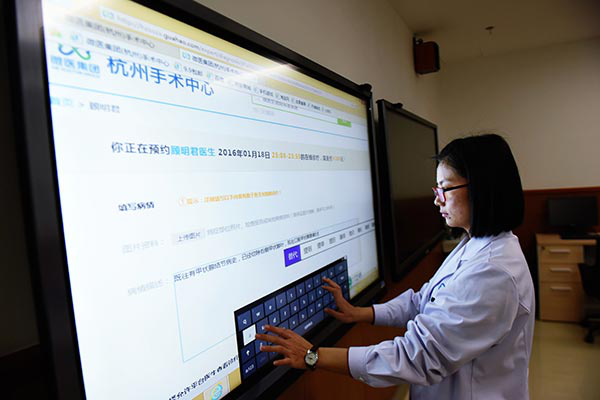The old saying, “shop till you drop” may soon capture a whole new meaning in Hangzhou, a city in eastern China’s Zhejiang Province. Local health officials have granted a special waiver and license for a private consortium to open up China’s first-of-its-kind medical mall.
Shoppers can visit Hangzhou Tower at 501 City Plaza and stroll browsing through retail shops located from the basement to the 5th floor and then get a medical check-up from a clinic that can be found on the 9th to 22nd floors.

(A member of medical staff operates big-screen online diagnostic equipment at a medical center in Hangzhou, capital of Zhejiang province. Photo/Long Wei from China Daily)
Patients can walk in to clinics that offer out-patient services or even in-patient surgeries. A large number of specialized clinics would cater to pediatrics, stomatology, psychiatry, cosmetics surgery, dental, gynecology, pharmacy and rehabilitation.
Opening up to private investors
The medical mall is known as, Quancheng International Medical Center, a US$15 million project funded by retailers - Jiebai Group and Baida Group Co. Ltd., as well as diagnosis technology developer Zhejiang Dian Diagnostics Co. Ltd.
The Zhejiang Health & Family Planning Commission had waived requirements for the medical mall, which would have required them to maintain a certain number of different medical departments on-site.
Accordingly, clinics can provide better care by sharing doctors, space, equipment and technologies without requiring a heavy investment.
Eric Chong, director of consultancy Hong Kong Institute of Asclepius Hospital Management, noted that the first medical malls had actually opened up in the United States in the 1980s.
“The concept of a medical mall is not new,” Chong told Caixin. “But the project is of interest to the healthcare community because it lowers the regulatory threshold for privately-run clinics.”
Reducing burdens on public hospitals
In may 2017, China’s Cabinet, the State Council, called for a more “diversified” healthcare system and allowed private capital better access to the industry.
As of 2016, China had over 16,000 private medical care facilities and 12,000 public hospitals, but according to Caixin, public hospitals accounted for more than 87 percent of all patients’ visits in the country.
Nearly all public hospitals struggle with over-crowded conditions while patients get short meetings with doctors.
Chinese doctors are seeking innovative solutions to lower workloads and to encourage more patients to receive treatment elsewhere, such as Hangzhou’s medical mall, which works in partnership with the Sir Run Run Shaw Hospital of Zhejiang University School of Medicine.
Meanwhile, we can anticipate the Internet to play a larger role in China’s healthcare.
‘Internet Plus’ hospitals to the rescue
“Public hospitals used to be very reluctant to embrace the Internet,” Qin Zexi, analyst at Beijing-based Research Consulting Group, told China Daily. “But now, that has been gradually changed by the government.”
Chinese tech giants, known as BAT, Baidu Inc., Alibaba Group and Tencent Holdings, have developed new platforms to provide more convenient and reliable access to medical care.
Tencent and Sequoia Capital had launched a new clinic chain - Tencent Doctors Work - in Beijing and Chengdu. Tencent facilities offer online and offline medical care and share doctors among local hospitals.
Chinese tech firms are delivering new Mobile apps to help patients purchase prescription medication and talk to physicians on video chats.
Patients can visit a neighborhood pharmacy to get blood pressure and temperature checks and then speak online to a doctor to get a prognosis and tap into e-prescriptions to purchase medicine.
Hangzhou’s ‘Internet Plus’ hospital
Hangzhou has long been recognized as one of China’s most internet-savvy cities, which is home to e-commerce giant, Alibaba Group.
The city stands at the forefront of introducing Web and Mobile-based healthcare platforms and opened up a local ‘Internet Plus’ hospital on Dec. 17, 2016.
The medical center was launched by a Sino-US team and utilizes the latest advances in IT (information technology) to provide medical services, including remote consultations, as well as face-to-face appointments.
The center is the base for R&D (research and development) and a site to offer clinical training and education. They will share medical resources with Wuzhen Internet Hospital, China's first Internet hospital, which is also located in Zhejiang.
In all likelihood, China will see more ‘Internet Plus’ hospitals and medical malls opening up nationwide in the near future.
New phase for medical care
In regards to medical malls, “it’s still too early to tell if the model would soon become popular or widely-adopted,” Shi Lichen, founder of Max Colla (Peking) Science & Tech. Ltd., a 3rd-party medical service system, told Sino-US.com.
Despite a few healthcare industry experts raising concerns over medical malls and ‘Internet Plus’ hospitals in China, Beijing has demonstrated courage to embark on reforms to improve the healthcare system.
Besides, the concept of shopping at a mall and getting a routine health check up all on one building sounds intriguing and worth a try. It’s quite possible this could lead to a hot trend in the industry and we could see it exported abroad.
Tmcgregorchina@yahoo.com
(The opinions expressed here do not necessarily reflect the opinions of Panview or CCTV.com. )

Panview offers a new window of understanding the world as well as China through the views, opinions, and analysis of experts. We also welcome outside submissions, so feel free to send in your own editorials to "globalopinion@vip.cntv.cn" for consideration.
















